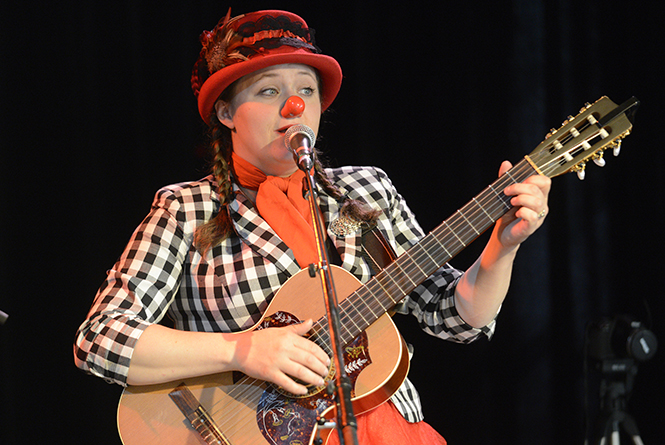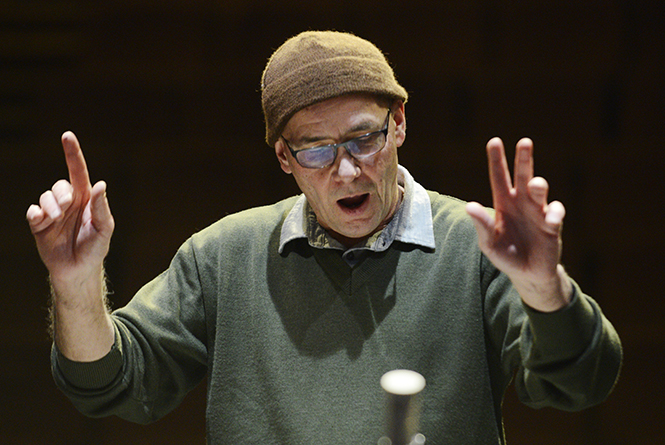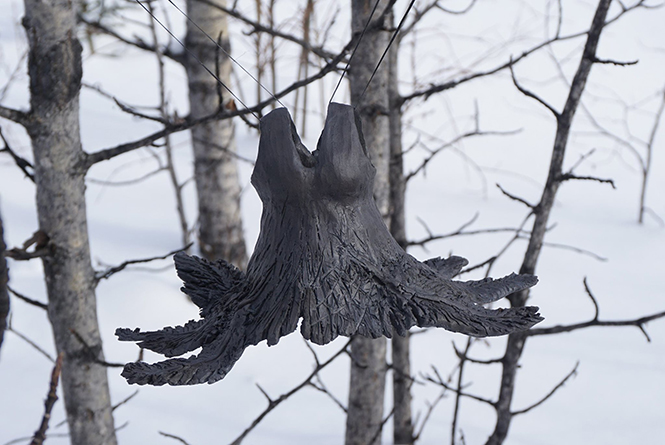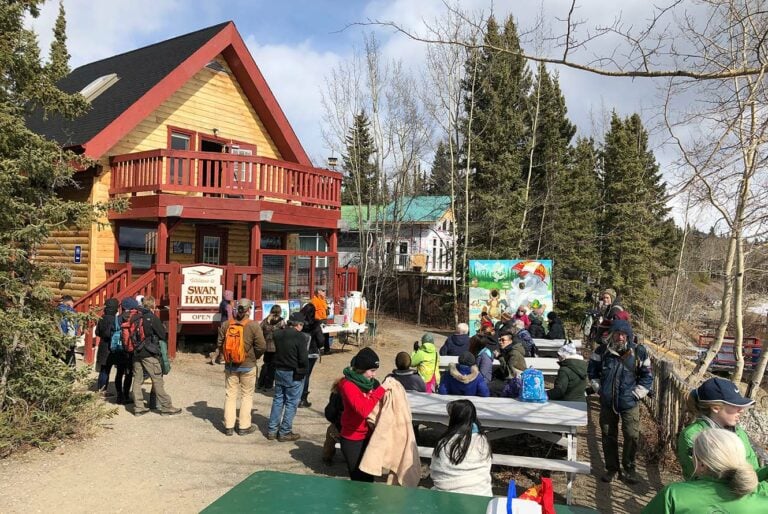Daniel Janke conducts the Problematic Orchestra during rehearsal in December 2019. Photo by Mike Thomas.
“We will get through it, it’s just patience and waiting it out,” he says. “Take advantage of this time and do what you do better when you come back out of it.”
Janke also has a commission for an opera project, so he’s doing a lot of writing for that, while also getting around to studio work he’d been putting off. Janke says he hasn’t found it particularly hard to focus amidst the uncertainty of the current pandemic.
Whitehorse musician Claire Ness has. She says March is typically a really creative time for her, but she’s not feeling that this year.
“Springtime is usually really fruitful,” says Ness. “I don’t feel stressed, but maybe my way of dealing with stress is pretending it doesn’t exist … or it could be that I’m constantly stuck at home with my nearly four-year-old.”
Ness says that has made her creative in a different way, by involving her son in her process and doing what he wants to do. So far, that’s included shooting living room music videos which she posts to her Facebook page.
Ness says she hasn’t tried to monetize them and has no plans to livestream concerts. She’s aware that’s one way musicians are trying to remain connected right now, but she doesn’t know how to feel about it.
“There’s something kind of beautiful about everybody doing these livestream concerts, but there’s something kind of scary about it too because this is a time for the music industry where artists are making almost nothing on their recorded music because we’re encouraged to push everyone to Spotify where we make virtually nothing and now we’re encouraged to do these livestreams for virtually nothing as well,” she says. “Live shows were the last vestige of profit for artists and now it’s kind of creating this new normal and creating a precedent for free shows as well.”
All of Ness’s shows have been cancelled for the summer, including a gig at the launch of Yukon University, the Midnight Sun Moppets Kids Festival, the Kluane Bluegrass Festival, a delegation to Tokyo Ness had applied to attend and an album launch she had planned for May.
“The Arctic Winter Games was a big one,” she says. “I was supposed to sing the national anthem and emcee the closing ceremony. I also had three pop-up concerts throughout the week, so it was probably close to $3,000 in contracts.”
Ness is also the producer for the Atlin Music Festival, which announced its cancellation in March. On a personal level, that means Ness is out the $2,000 a month her contract was supposed to bring in over seven months. Professionally, she says Atlin organizers are trying to figure out how they might direct festival funding (maybe a fundraiser, or a mini-festival later in the summer if it’s safe to do so) to support the people of Atlin.
“The festival has a huge economic impact,” she says. “I don’t know the numbers … I can’t even guess, but it’s huge in their annual economy.”
Whitehorse writer Eva Holland is also feeling an economic squeeze this spring, though in a different way than she’d anticipated.
Holland’s book, Nerve, a work of non-fiction that acts as both a memoir of grief and an exploration of facing and conquering fears, comes out April 7. She had cleared her plate of deadlines and freelance work so she could focus on touring in support of the book.
“On the one hand, I feel lucky,” Holland says. “I had planned for a low-income couple of months.” But she hadn’t planned on zero income. A number of her readings and workshops were paid engagements. Now there’s uncertainty about when they might occur.
Same goes for her book launch. It was supposed to take place at Wayfarer Oyster House, which is currently only open for takeout. At the beginning of March, Holland says she joked about the launch being cancelled. It didn’t seem possible then, that the whole book tour might be put on hold indefinitely.
Right now, Holland is focusing on the things that can be done as planned. Mac’s Fireweed is selling copies of Nerve and her publicist is setting up radio interviews and podcast appearances, hoping to get the book out there.
“It’s such a weird position to be in, of feeling like you’re schilling a product at this moment, but I also earnestly believe it might be helpful for some people to think about how fear and anxiety manifest,” she says. Her book, which delves into the science behind such feelings (including the way emotional symptoms can manifest as a physical reaction), might be helpful to readers looking to change their relationship to anxiety.
It’s something a lot of people have been thinking about, including Whitehorse artist Nicole Bauberger.





